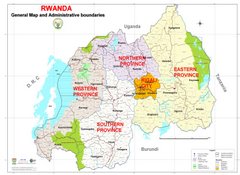Gwynne Dyer: Rwanda president Paul Kagame tiptoes around democracy
By Gwynne Dyer
Rwanda president Paul Kagame will not risk real democracy, despite a remarkable economic growth rate of 11 percent last year.
Did Paul Kagame really stop the genocide in Rwanda 16 years ago, or did he just interrupt it for a while?
That question frightens him so much that he will not risk everything on the outcome of a democratic election.
Kagame is running for reelection to the presidency of the traumatised central African country next month. If economic success automatically brought political success, he would be a shoo-in: Rwanda’s economy grew by 11 percent last year.
But in fact, his resounding election victory in 2003 was the result of ruthless manipulation, and this one will be the same.
In recent months, opposition party leaders in Rwanda have been arrested and charged with denying the genocide.
An opposition newspaper was banned and its co-editors attacked. (One died, one survived.)
Leading generals in the Rwandan army have been arrested or have fled into exile. (One was wounded last month in an attempted hit in South Africa.)
So is Kagame over-reacting? Maybe.
If you cut Kagame open, you would find engraved on his heart William Faulkner’s terrible truth: “The past is never dead. It’s not even past.”
One-tenth of Rwanda’s population–at least 800,000 people, Tutsis and those who tried to protect them–were murdered by their neighbours, mostly with machetes, only sixteen years ago.
Not nearly enough time has passed yet for generational turnover to take the edge off the grief and the hate. Everybody pretends it’s over, but of course it isn’t. How could it be?
Kagame’s whole life has been shaped by genocide. He grew up in Uganda, where his parents fled when an earlier wave of violence killed about 100,000 Tutsis in Rwanda in the early 1960s.
He became the leader of the Rwandan Patriotic Front, a mainly Tutsi exile organisation dedicated to overthrowing the Hutu extremists who ruled the country, and he led the RPF army that marched in to stop the great genocide of 1994.
He knows, of course, that Tutsis and Hutus are not really separate ethnic groups.
All of Rwanda’s 19 major clans includes both Tutsis and Hutus. They speak the same language and they live in the same villages.
The term once distinguished cattle-herders from farmers, and later the wealthy from the poor. Rich Hutus could become Tutsis–but the Tutsis naturally always remained a minority of the population.
He also knows, however, that the colonial authorities exploited those class differences and gave the Tutsis political authority over the Hutus in return for their loyalty.
By the later 20th century the Tutsis and Hutus had become ethnic groups for all practical purposes, with a constant undercurrent of resentment by the Hutus against the Tutsis.
After independence in 1960, the killing got underway very quickly. It peaked in 1994.
This past will not leave Rwanda alone. The very words “Tutsi” and “Hutu” have now been banned in Rwanda, but a ministerial investigation in 2008 found anti-Tutsi graffiti and harassment of Tutsi students in most of the schools that were visited.
The army is exclusively Tutsi and the government almost entirely so, because Kagame does not really believe that this generation of Hutus can be trusted.
To make his position even more precarious, Tutsi solidarity is breaking down.
The arrests, exile and attempted assassination of various generals may be in response to real plots.
Most Tutsi generals belong to the Nyiginya clan, which traditionally provided the country’s king. Kagame is from the Umwega clan, and some of the Nyiginya think that power has remained in the wrong hands for too long.
It is an awful situation, and Kagame has only one strategy for avoiding a return to genocide: hang on to power, and hope that rapid economic growth and the passage of time will eventually blur the identities and blunt the reflexes that have made this generation of Rwandans so dangerous to one another.
His model is Singapore, an ethnically complex state that avoided too much democracy during the early decades of its dash for growth.
If Rwanda could become the Singapore of central Africa, then maybe its citizens would eventually come to believe that their stake in the country’s new stability and prosperity was more important than the history.
But Singapore did not have so far to travel, and its history was not drowned in blood.
The logic of Kagame’s strategy obliges him to stay in power: his first duty is to Rwanda’s Tutsis, at least half of whom have already been murdered.
But he must provide prosperity to the Hutu majority too, in order to reconcile them to Tutsi survival, and his relatively corruption-free government has made impressive progress towards that goal.
Nevertheless, in a free election, most Rwandans would vote along ethnic lines.
His Rwandan Patriotic Front would instantly be replaced by a Hutu-led regime of unknowable character and purpose. He dares not risk it, so real democracy is not an option.
If Kagame is now killing opposition journalists and dissident generals, then he is making a dreadful and probably fatal mistake, but it may not be him.
In the ruthlessly Machiavellian world of Rwandan politics, other possibilities also exist. Either way, he has the loneliest, scariest job in the world, and he must know that the odds are long against him.
The new edition of Gwynne Dyer's latest book, Climate Wars, has just been published in Canada by Random House.





